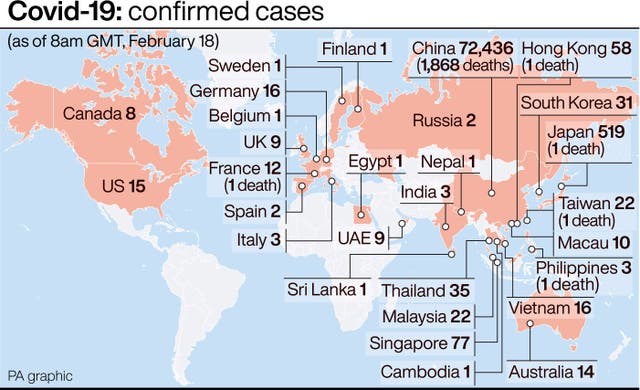
The coronavirus outbreak in China has put South Korea’s economy into an “emergency situation”, its president said, while Japan is on the brink of recession as businesses across the wider region struggle to cope with the impact.
As many Chinese finally go back to work after their longest Lunar New Year holiday ever, the economic fallout from the outbreak that began in the central city of Wuhan may be just beginning.
Companies are warning their bottom lines will take a hit, and are ramping up stimulus measures for economies that just weeks ago were hoping to see recoveries after months of uncertainty due to trade tensions and slowing global growth.
“Emergency situations require emergency measures,” South Korean President Moon Jae-in said on Tuesday, calling for aggressive action to support companies dependent on trade with China and to encourage consumers to spend more.
“The current situation is very serious, even more so than thought,” Mr Moon said. “We should put every measure we can think of on the table, regardless of whether there were precedents or not, and employ every means possible.”
Many in the region were hoping that an easing of trade tensions thanks to a truce between the US and China in their tariff war would help revive sluggish trade this year, but the outbreak has sideswiped the region with a raft of new, potentially much broader uncertainties.
Central banks across the region have already begun slashing interest rates to help ease credit as tourism arrivals plunge and manufacturing and delivery networks get entangled in bottlenecks caused by lockdowns inside China intended to help contain the spread of the virus, which has killed more than 1,870 people and infected at least 73,000 globally.
Asian economies have become increasingly reliant on trade with China and tourism catering to growing legions of Chinese travellers. The other regional powerhouse, Japan, saw its economy, the world’s third-largest, contract by 6.3% in annual terms in the last quarter of 2019, even before the virus outbreak spiralled into a crisis.

The rebound in manufacturing and other business activity after the outbreak of severe acute respiratory syndrome, or Sars, in 2003 suggests the damage to manufacturing industries may be transient.
But the blow to regional tourism could persist, given the broader travel restrictions and precautions put in place by regional governments and the much higher number of people affected: Sars killed fewer than 800 people and infected only about 8,000.
China has cancelled two of the biggest business happenings of the year: a trade fair in Guangzhou and the Beijing motor show, adding to the growing number of conferences and sports events being postponed or called off due to the outbreak.
Tourism arrivals in Thailand, Singapore and other regional hubs are down sharply, leaving many who depend on steady flows of Chinese and other travellers scrambling for alternative ways to get by.

Economists are forecasting that China’s growth could stall into the low single digits in this quarter, while Japan, where dozens of people have been confirmed infected with the virus, is almost certainly heading for recession.
Governments elsewhere are also preparing to act to cushion the blow from the virus. Singapore’s government announced a budget with an extra 6.4 billion Singapore dollars (£3.5 billion) in special measures to provide extra health care funding and subsidies for businesses and households.
Farmers in south-east Asia, especially tropical regions along southern Chinese borders, are struggling to find markets for crops unable to make it to market due to transport disruptions and quarantine restrictions in central and eastern China.
But disruptions to tourism and the manufacturing sector are having a much broader reach.
Chinese authorities are encouraging factories to get back to work, but a survey of manufacturers in the Yangtze River industrial region conducted by the American Chamber of Commerce in Shanghai last week found that nearly 80% did not have enough staff to run at full capacity. Nearly a third said logistics issues were their biggest concern.
More than two-thirds of the 109 companies surveyed had already gone back to work, but many said their businesses were being hindered by quarantine restrictions and uncertainties over government approvals.

Enjoy the convenience of having The Sunday Post delivered as a digital ePaper straight to your smartphone, tablet or computer.
Subscribe for only £5.49 a month and enjoy all the benefits of the printed paper as a digital replica.
Subscribe